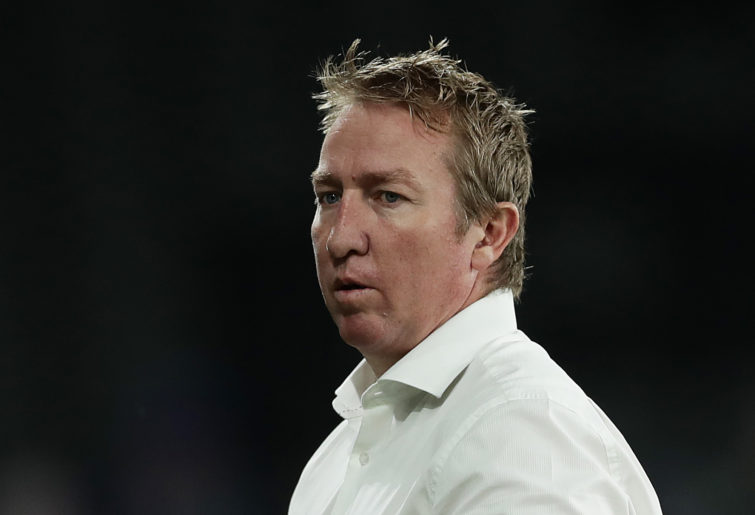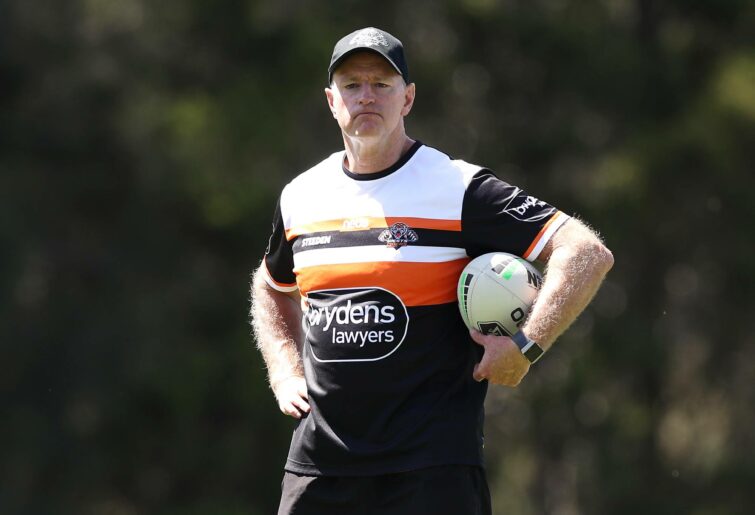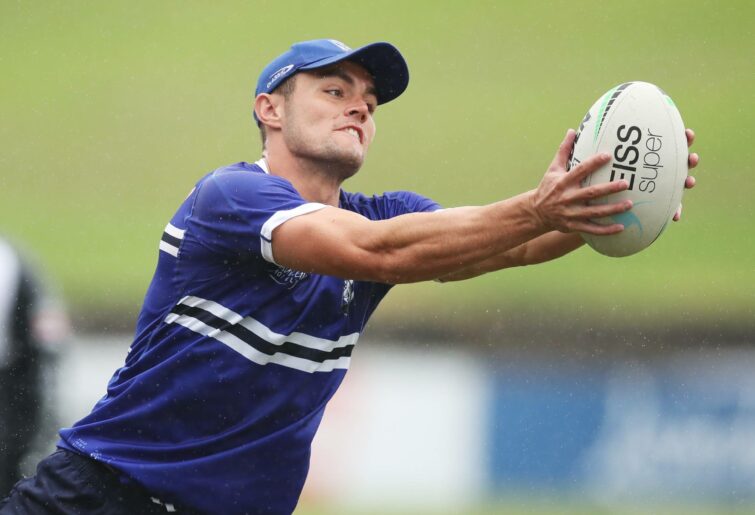MUST WATCH: Adam Reynolds can barely move, still pulls off 'the greatest intercept of all time'
Outrageous from the Broncos skipper on 'a wooden leg!'
Opinion
The NRL is not a regular sporting environment when it comes to winning.
For one, there’s no relegation – an uncommon system in Australia but common globally – which means even the worst team gets repeated attempts at being good.
Secondly, it’s a salary-capped sport, so theoretically even the worst team gets the same budget as the best. (Stop sniggering at the back.)
Thirdly, it exists in a highly parochial media market where it is the only sport worth talking about in the time of the year in which it is played.
Nobody else – apart from the AFL in Melbourne – has this. In US sports they have the first two, but not the third, and in soccer there is often the third, but not the first two.
Perhaps the IPL has all three – it’s not a real sporting contest so much as a permanent all-star game where the results don’t actually matter. Without relegation, a team can theoretically be rubbish forever – at least until the league decides to remove them – but it also allows for long-term rebuilds because there is sufficient time to recover.
The salary cap helps, because it forces the best teams to relinquish players and thus allows the worst to pick them up, rather than hoarding talent at the top.
Last year is a case in point: four of the top six in 2021 were in the bottom five in 2016, with Parramatta having been deducted points, though they went on to finish dead last in 2018 too. Within five years, the league had essentially flipped, and this, of course, is how it is meant to work.
Incidentally, the best performing of those four in the current ladder – the Roosters and Eels – have the same coach as they did when they were at the bottom in 2016, while the other two – Manly and Souths – were coached by Trent Barrett and Michael Maguire, who occupy the bottom three today.
Those that backed themselves, and were backed by their front office, eventually reaped the rewards.

This is where the media environment point comes in. We lurch from crisis to crisis, punching bag to punching bag, with sacking the coach and starting over the obvious, if often incorrect, option. Even though the competition rewards a long-term approach, it requires a front office that resists the short-term urge to change.
Coaches are never allowed to publically state that they are not trying to win every game, or at least, aren’t bothered about winning certain games, because we do not allow it, although it is patently obvious that this is the case.
Rugby league is unusual in that every team has to try to win every game, and it is basically impossible to set up any other way. The draw is not something that you can aim for and accepting a small defeat is to invite a big one.
Australia also lacks a cup competition, but in the UK, where the Challenge Cup regularly pitches full-time pros against semi-pros or even outright amateurs, this is there for all to see. Fatigue, and its cousin, effort, are seen to be such determining factors in victory that a course of action that involves accepting the odds against you will backfire.
The result is that coaches have to say that they are going to win even when they don’t think it themselves and players have to convince themselves that they have a chance otherwise they absolutely don’t.
A team can play conservatively, for sure, but it is inbuilt into the rules that you can’t opt to simply defend, as a soccer team going for a 0-0 might, or monopolise the ball, as a defensively orientated rugby union team might, or play for time, as an overmatched cricket team can in Tests.
This is entirely by design, a process wrought over 125 years of rule adaptations. If you try to play defensively, you will eventually be tired out and concede, because the weighting is in favour of scoring rather than against it. Compare to football, where you can stick 10 men behind the ball and ask the other team to break you down.
The six tackles emphasise ‘use it or lose it’, unlike rugby union’s endless phases, and time-wasting is basically impossible in the new era, unlike in cricket, where you can block your way to a draw.
It’s because of this that coaches should try to pick their battles a bit better. Winning today – or at least, convincing yourself that you can win today – might be the enemy of winning next week, next month or next year.
Round 5 serves as a good example of how teams might be better thinking of short-term pain for long-term gain, and how coaches and organisations might be better served by not reading into results too much.
This weekend will see the teams that are, in my opinion, the four poorest – that’s the Tigers, Dogs, Dragons and Broncos – run into three of last year’s best – the Panthers, Rabbitohs and Roosters – plus the most improved of this year, the Sharks.
The esteemed five minds of The Roar tipping panel (myself included) are unanimous in picking all the results the same.
That’s just one round, however. Let’s expand it out to a month or so of footy. Our bottom four face last year’s top six plus the Sharks a lot.
The Bulldogs’ run goes Panthers, Rabbitohs, Roosters, Broncos (in Brisbane) and they just faced the Storm and Manly. They’re 1-3 and you can’t see them winning any of those upcoming fixtures.
The Tigers face the Sharks, Eels, Bunnies, Dragons and Manly next up, so at best, they might have a single win on the board, if they beat the Dragons in Wollongong.
On those Dragons: they just went Eels, Sharks, Panthers and lost all three, and now go Souths, Knights, Roosters, before that Tigers showdown. The best that you can say is that they’re halfway through their nightmare stretch.
The Broncos meanwhile go Roosters, Panthers, Bulldogs, Sharks, Bunnies and Manly and you might make them favourites once, against the Dogs at home.
Let’s assume that we’re going into Round 10, Magic Round, and we have a last four that looks like this: Tigers (0-9), Bulldogs (1-8), Dragons (2-7), Broncos (3-6).

What will those teams look like then? Maguire might not have a job at the Tigers and Luke Brooks will be in reserve grade.
Barrett will be coming out of retirement to play halfback for a Dogs side that hasn’t scored a point in a month.
Anthony Griffin will have Josh McGuire at five-eighth and Ben Hunt at fullback while the NSW Cup team rules the roost with an outstanding young spine.
Kevin Walters will be wearing a boxing ref’s bowtie as his players take swings at each other, but Kotoni Staggs still won’t be involved.
We could, however, think about it differently. This is where benchmarking comes in.
Benchmarking revolves around setting achievable standards, based on realistic and relevant competitors, and then judging yourself against them. It’s an exercise in prioritising, playing the long game and working out where you stand.
It’s how you can judge progress as a team even though results might not actually change, by factoring in the games that matter and using those that don’t as a potential learning exercise.
In a non-salary-capped, relegation-threatened competition, there is the expectation that you will beat those around you and do your best against those above. This isn’t endorsed, but everyone knows it happens.
Mick McCarthy, the then-Wolves manager, was once fined for resting his entire outfield selection for an away trip to Manchester United in anticipation of a relegation battle with Burnley a few days later. Naturally, they lost 3-0 at Old Trafford but won 2-0 against Burnley and stayed up.
That’s because a Premier League team, on average, needs to win one in three games to survive – give or take a few draws – and thus it makes sense to pick your battles.
All the other games can essentially be written off as learning exercises, and anything achieved is a bonus.
In this weekend’s NRL, we are seeing two diverse approaches to this from the Bulldogs and Dragons.
The Dogs have made a decision that will likely have no effect on the result in the short term – recalling halfback Kyle Flanagan – but could well benefit long term.
Flanagan facing unbeaten reigning champs Penrith is something of a hiding to nothing, and there has been much commentary about this.
Parking for a moment the ludicrous argument about duty of care – as if Flanagan would have preferred to play NSW Cup this weekend – there is a question about how Barrett should judge the performance of his team in a game in which they will start as $8 outsiders.
The line is +20.5, so get within that? Or simply score some points, given the Dogs have managed an average of just over one try per game so far?
It might be worth just using this game as a cohesion-building exercise, a chance to test their defensive resolve against elite opposition and build experience that might steel the Bulldogs ahead of the match that is actually relevant to their season, Round 7 in Brisbane.
The Dragons, on the other hand, have gone the other way. Their young spine options – halfback Jayden Sullivan, fullback Tyrell Sloan and five eighth Junior Amone – are all out of the run-on side with Amone on the bench, Sloan in the reserves and Sullivan listed as injured until next week.
Instead, they will start with Moses Mbye at fullback – where he has played just a quarter of all his first grade appearances – and Jack Bird at five eighth, a role he has occupied even less. Griffin admitted himself that neither would be a permanent fixture.
This can be seen one of two ways. If we’re being charitable, Hook might look at the three upcoming games – Knights, Roosters then Tigers – and think of them as the perfect chance to get all three young players in, peaking with the Tigers’ visit to Wollongong, and this trip to Souths as a needs-must, do-a-job game where experience might matter more.
On the other hand, he could just not be willing to play the young players, which begs the question of whether he ever will, and if those players – who won comps in the junior grades at Illawarra – will still be around long term.
By the time the Dogs run into the Broncos in Round 7, they might have something approaching an attack (assuming Barrett gives Flanagan a fair crack) but could the same be said of the Dragons by their Round 8 Spoonbowl with the Tigers?

Benchmarking is also vital for the Tigers and Broncos. Their goal, despite what they say, is simply to be better than they were before.
If Maguire knows he won’t be sacked – and believes his bosses when they tell him as much – then there is the possibility for him to send out his Tigers to play in a manner that eventually leads them to being better.
That might not manifest in results for several weeks, in which the outside noise will only grow, but it might be vital to the overall trajectory of the season.
Imagine that the Tigers decide that the team they run out next weekend against the Eels – a game they will likely lose by a lot – is going to be the same team they pick in Round 11, when they face the Dogs at Leichhardt Oval on a Friday night.
Even though they might lose every game between now and then, the chances of that team winning the game that actually matters in terms of defeating a rival around them – like it would in a relegation battle – would be far higher due to increased time playing together, learning behaviours and building trust.
Ben Darwin, the former Wallabies prop turned analytics expert, has expounded on this at length: losing together builds team cohesion as well as, if not more than, winning together.
You could actually argue that now, after a 3-21 season last year, the Bulldogs are living proof of this. They look more cohesive, especially defensively, despite defeats. They lose by less now, and losing by less is the first step towards winning.
The Broncos have this chance too. They could target specific fixtures – Dogs at home in Round 7 and Magic Round as a showpiece event – and build towards those with the idea that that they will be best positioned to win them.
That would give them two games (Panthers, Roosters) that they could use to tune up, then the Dogs. Then another (Sharks, Bunnies), then Manly at Magic.
For Brisbane in their current iteration – or for any of the four bottom sides – winning a third of their fixtures is a good benchmark.
An 8-16 record come season’s end was good enough for 11th last year. The step from one in three to one in two – good enough to play finals in 2021 – is much smaller.
The first step on that process might well be benchmarking realistically, prioritising effectively and working long term. They’re in a league that allows a team to do that.
Coaches are judged against results, but results over a season, not week-to-week. Movement from 16th to 12th to eighth and up might take three years, but that can start today.
If they treat every game as a winnable fixture, however, then they might lose this week, next week and the week after, for a long time.